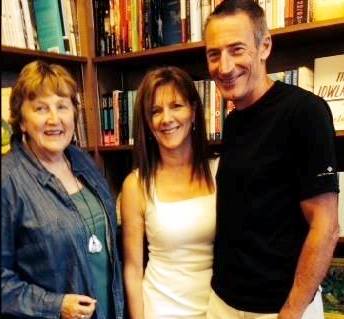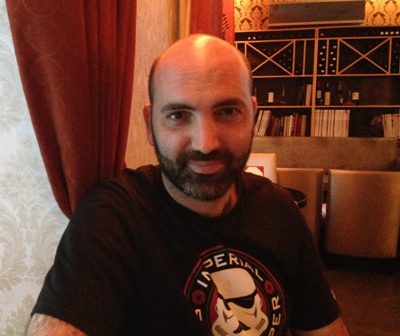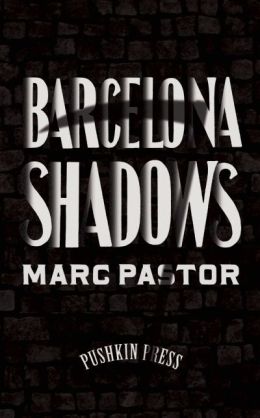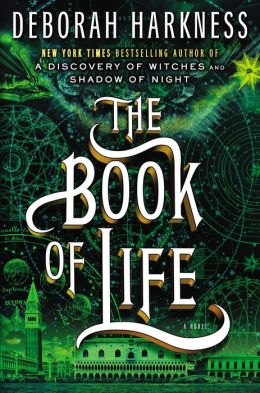'Our Reps Rock'


 Schuler Books, which has three stores in Michigan and is owned by Bill and Cecile Fehsenfeld, is buying Nicola's Books, the Ann Arbor store that owner Nicola Rooney put up for sale in January. Under the agreement, the store will continue to operate as Nicola's Books and Rooney will stay on as a consultant during the transition.
Schuler Books, which has three stores in Michigan and is owned by Bill and Cecile Fehsenfeld, is buying Nicola's Books, the Ann Arbor store that owner Nicola Rooney put up for sale in January. Under the agreement, the store will continue to operate as Nicola's Books and Rooney will stay on as a consultant during the transition.
At the time she announced Nicola's was for sale, Rooney said she wanted to make a change due to family issues and would do so gradually if need be. "We're not doing this because we're in any sort of a crisis. I'm doing this to ensure the future long-term health of the business."
Yesterday, Rooney commented: "Joining the family of Schuler bookstores ensures that the future of Nicola's Books will be in good hands. The familiar faces of our booksellers will be staying on, so customers should notice few changes. During discussions with Bill and Cecile, I have found that we have remarkably similar views on what is important about keeping a local community bookstore strong and lively. I am sure that both organizations will learn from each other, and will evolve into a stronger group as a result. Our current staff looks forward to working with respected fellow industry professionals."
Nicola's was founded in 1995, when Rooney bought a four-year-old Little Professor franchise store and changed its name. The 9,800 square foot store is in the Westgate Shopping Center. Rooney has a Ph.D. in chemical engineering from Cambridge University and worked in that field for several decades, until the mid 1990s, when her company was bought and her job transferred to Germany. Last year Nicola's won the Pannell Award, cited for its "over and above" commitment to children's books and "partnering skills to benefit children, families, and the community at large." In February, Rooney won the 2014 Community Book Award, sponsored by the Kerrytown BookFest and awarded to the person in the Greater Ann Arbor area who helps create and retain "a vital book culture." She and the store were cited for hosting or sponsoring more than 200 events last year, serving schools at book fairs, providing books for library events in the area and hosting book clubs, writer's groups and Master Gardeners' lectures, among other things. Rooney serves on the board of the Ann Arbor Book Festival, is a sponsor and partner of Kerrytown BookFest and has served on the board of Washtenaw Literacy for 10 years.
Schuler Books has stores in Grand Rapids, Lansing and Okemos. Cecile Fehsenfeld said, "This key location in Southeast Michigan will complement our existing three locations throughout West and mid-Michigan. We are thrilled to add Nicola's to our family of bookstores, and will continue to provide the great service and community programming that Nicola's Books' loyal base of long-term customers has supported for so many years."
Bill Fehsenfeld noted that he and his wife met while both were working as booksellers at Ulrich's Bookstore in Ann Arbor, and both are University of Michigan graduates. "It feels like we are coming home."
"We are very excited to become an integral part of the growth and vitality of the Ann Arbor community," Cecile Fehsenfeld added. "We look forward to great things from our new relationship with Nicola's Books, a great bookstore, and are excited to become part of an enthusiastic network of locally owned businesses in the area. We are confident that Michigan's readership will continue to grow in its support of local and independent businesses like ours."
Schuler Books was founded in 1982 and evolved over the years, once selling sizable amounts of music and film, adding used books and sidelines. It now has Chapbook Cafes in each shop, an Espresso Book Machine and a publishing imprint, the Chapbook Press. Schuler grew steadily to five stores, but in January 2013 closed its store in downtown Grand Rapids, which it called "an experiment with an urban format store," and in April, its closed its Walker, Mich., store, which wasn't as profitable as it needed to be to renew its lease for 10 years.
Effective today, Maria and Danny Roden have bought Orinda Books, Orinda, Calif., from Janet Boreta, who founded the store with four other women 38 years ago and took over sole ownership several years later.
 |
|
|
Janet Boreta with new owners Maria and Danny Roden. |
|
In a post, the store wrote in part: "Janet Boreta has guided Orinda Books since its inception, through its early years, its textbook years, surviving the chains, the warehouse stores, and e-readers. Lamorinda [the communities of Lafayette, Moraga and Orinda] itself has been a major partner in this survival. The bookstore has benefited from Lamorinda friends and neighbors belief in the importance of an independent bookstore in their community.
"Maria was formerly the store manager at Orinda Books and more recently has been at another local independent bookstore. Her bookstore expertise, her love of books and enthusiasm for the place they can play in lives of children and adults will help Orinda Books continue on its happy path as 'the bookstore in Village Square.' Look for some exciting changes but also take pleasure in knowing that your friendly local Orinda Books is 'good to go' for quite a few more years."
 bbgb tales for kids, Richmond, Va., is moving to the Carytown neighborhood this month, Richmondbizsense.com reported. The new 1,600-square-foot space is 500 square feet larger than the store's current space in the Museum District and will allow more room to host events.
bbgb tales for kids, Richmond, Va., is moving to the Carytown neighborhood this month, Richmondbizsense.com reported. The new 1,600-square-foot space is 500 square feet larger than the store's current space in the Museum District and will allow more room to host events.
Owners Jenesse Evertson and Jill Stefanovich bought the store, then called Narnia Children's Books, in 2010. They have since renamed it and added YA and adult books, which now account for about a quarter of inventory.
bbgb tales for kids was among the recipients in the second round of James Patterson bookstore grants.

She started her publishing career at Simon & Schuster and worked at New American Library before joining Penguin. According to the Star-Ledger, she was a trustee of the Roselle (N.J.) Library Board since 1999, and most recently was president. She was also a founding member of the Friends of the Roselle Library and founding member of the Roselle Oprah Book Club.
Visiting hours at the Sullivan Funeral Home, 146 East 2nd Ave., Roselle, N.J., are tomorrow, Wednesday, 2-4 p.m. and 7-9 p.m. The funeral will be held on Thursday, July 3, at 9 a.m., starting at the funeral home and then at the Church of St. Joseph the Carpenter, Roselle, where a Funeral Mass will be offered at 10 a.m. Condolences at sullivanfh.net.
---
Allen Grossman, "an award-winning poet whose work bridged the Romantic and Modernist traditions, claiming nobility and power for poetry as a tool for both engaging the world and burrowing into the self," died last Friday, the New York Times reported. He was 82. His books include The Woman on the Bridge over the Chicago River, The Philosopher's Window and Other Poems, How to Do Things with Tears, Descartes' Loneliness and The Ether Dome and Other Poems.
---
Dermot Healy, who "personified the notion that some writers write because they simply have to" and "knew Ireland, better than that; he understood and loved it, without rancor and without a hint of sentimentality," died June 29, the Irish Times reported, noting that with A Goat's Song (1994), he "wrote his great book, it is one of the finest Irish novels." Healy was 66.
|

"Meet some dreamers whose visions of being booksellers in resort towns became reality," the Washington Post noted in featuring several independent bookstores that "rely on vacationers' spending, regional-interest books and local products." A summer visit to New London, N.H., in 2012 ultimately became a new career for Anna Miner, who "found herself indulging in the typical vacationer's fantasy: Can't I just live here year-round?" Miner and her husband, Chris, quit their jobs in Braintree, Mass., and purchased the Morgan Hill Bookstore from its retiring founders, Connie Appel and Peggy Holliday. "It hasn't been without its challenges," she said, adding: "We love the change in lifestyle."
A summer visit to New London, N.H., in 2012 ultimately became a new career for Anna Miner, who "found herself indulging in the typical vacationer's fantasy: Can't I just live here year-round?" Miner and her husband, Chris, quit their jobs in Braintree, Mass., and purchased the Morgan Hill Bookstore from its retiring founders, Connie Appel and Peggy Holliday. "It hasn't been without its challenges," she said, adding: "We love the change in lifestyle."
Nearly 40 years after Steve and Barbara Crane opened Browseabout Books in Rehoboth Beach, Del., they now "own one of the largest independent bookstores in the Mid-Atlantic. At its new location, just a few blocks from the boardwalk, the store sprawls some 14,000 feet. It is open every day but Christmas," the Post wrote. Calling his diverse product selection "an emporium of good times," Crane said, "It's sort of like a grocery store doesn't just sell groceries," but books are still "what brings people in."
In Manteo, N.C., Jamie Layton of Downtown Books "has trusted her instincts, steering away from the big, hardcover bestsellers that people can buy cheaper elsewhere and focusing on lower-cost paperbacks and books of local interest," the Post noted. Layton said being near the beach can be an advantage in the age of technology, since even if an e-reader "says it's waterproof and says you can read it in the sun, do you want to take it and sit next to the pool? I think people feel more comfortable in sand and water situations with a real book than with a $200 digital device. I would."
Bill Rickman, co-owner of Island Bookstore, with branches in Kitty Hawk, Duck and Corolla, N.C., observed: "One of the ways you judge a bookstore is by the poetry section. Those books sell quite well. I'm not exactly sure why." He speculated, however, that the vacation mind-set may be responsible: "It took me a couple of years not to carry self-help, diet or personal finance books. Nobody wants to read them on vacation."
At Little, Brown:
Fiona Brown has been promoted to publicity manager. Before joining the company in April 2013, she worked in the publicity departments at Riverhead and Scribner.
Catherine Cullen has joined the company as senior publicist. Prior to that she worked in the publicity department at Crown.
Independent Publishers Group has added two publishers:
Museyon, which publishes regional and niche titles on travel, history, art and film. It has a backlist of 16 titles and plans to publish 10 to 15 new titles per year, including Chronicles of Old Chicago and Chronicles of Old San Francisco this fall. (Effective August 1.)
Tantan Publishing, a publisher of children's picture books that introduce math and other concepts such as size, time and shape to young readers. Based in South Korea under the name iBook Park, Tantan Publishing is new to the North American market. (Effective April 2015.)
Trafalgar Square Publishing has added four publishers, all effective January 1:
Little Island Books, Dublin, Ireland, which began as an imprint of the literary publishing house New Island Books and has been an independent company since 2010. Little Island publishes 8 to 10 books for children and teenagers every year, mostly by emerging Irish authors. Little Island Books is run by publisher Siobhán Parkinson, also a writer who was the first Laureate na nÓg, an honor awarded in Ireland once every two years to a distinguished writer or illustrator of children's books.
Berbay Publishing, Melbourne, Australia, a children's publisher that publishes 8 to 12 hardcover picture books a year and was shortlisted for the 2014 Bologna Prize for Best Children's Publisher of the Year.
Ammonite Press, a British publisher of practical photography camera guides and technique handbooks, larger format coffee table books, and social history and gift books on history, fashion, music, sports, and politics. Ammonite publishes about 20 books each year, with a backlist of 100 titles.
Fine Feather Press, a British publisher of natural history titles for children that was shortlisted for the Independent Publishers Guild best newcomer award 2014.

Today on NPR's Fresh Air: Paul Greenberg, author of American Catch: The Fight for Our Local Seafood (Penguin Press, $26.95, 9781594204487).
---
Tomorrow morning on Good Morning America: Natasha Case and Freya Estreller, authors of Coolhaus Ice Cream Book: Custom-Built Sandwiches with Crazy-Good Combos of Cookies, Ice Creams, Gelatos, and Sorbets (Rux Martin/Houghton Mifflin Harcourt, $25, 9780544120044).
---
Tomorrow on Tavis Smiley: Stephen Dubner and Steven Levitt, authors of Think Like a Freak: The Authors of Freakonomics Offer to Retrain Your Brain (Morrow, $28.99, 9780062218339).
---
Tomorrow night on a repeat of the Daily Show: Daniel Schulman, author of Sons of Wichita: How the Koch Brothers Became America's Most Powerful and Private Dynasty (Grand Central, $30, 9781455518739).
---
Tomorrow night on a repeat of the Colbert Report: John Green, author of The Fault in Our Stars (Speak, $12.99, 9780142424179).
 Legendary noir mystery writer Raymond Chandler, creator of fictional private detective Philip Marlowe, will get a star on the Hollywood Walk of Fame, becoming one of the relatively few authors--Ray Bradbury, Dr. Seuss, Adela Rogers St. Johns, Ogden Nash among them--to be so honored.
Legendary noir mystery writer Raymond Chandler, creator of fictional private detective Philip Marlowe, will get a star on the Hollywood Walk of Fame, becoming one of the relatively few authors--Ray Bradbury, Dr. Seuss, Adela Rogers St. Johns, Ogden Nash among them--to be so honored.
"In the many film adaptations of his work, several actors played Marlowe, including Elliott Gould, Dick Powell, Robert Montgomery, James Garner and Robert Mitchum," Jacket Copy reported, adding: "But Chandler didn't have much to do with his books being made into films--he was a screenwriter on other projects. The greatest of those were adaptations of other novelists' work: Strangers on a Train by Patricia Highsmith, directed by Alfred Hitchcock, and Double Indemnity, written by James M. Cain."
Winners of this year's Andrew Carnegie Medals for Excellence in Fiction and Nonfiction were announced at the American Library Association's annual conference in Las Vegas. Donna Tartt was presented with the fiction prize for her novel The Goldfinch (Little, Brown), and Doris Kearns Goodwin was the nonfiction medal winner for The Bully Pulpit: Theodore Roosevelt, William Howard Taft, and the Golden Age of Journalism (S&S). Each author received $5,000.
"I know I speak for the whole award committee when I say that we take the responsibility of selecting the winners very seriously indeed," said Nancy Pearl, chair of the selection committee. "The reward for all our hard work is that readers can be assured that the three finalists in each category, and of course the winners themselves, are terrific reads, wonderfully written, thoroughly absorbing, and illuminating."
---
Twenty-nine authors received prizes totaling more than £82,300 (about US$140,150) at the Society of Authors' Awards in London. See a complete list of winners here.
Marc Pastor, the author of Barcelona Shadows and a crime scene investigator in his home city of Barcelona, Spain, wanted to be a writer for as long as he could remember. As a child, he never saw himself growing up to be a police detective. Rather, he read books by writers like Stephen King and Dean Koontz and envied the emotions that those writers could stir up in readers. As a young man he sought to study journalism in university, but, when his exam grades were not high enough for admittance into the journalism program, he turned to criminology. "It's about curiosity," Pastor explained. "Journalism and criminology both are based on curiosity, on watching--studying the reasons why people do what they do."
"It's about curiosity," Pastor explained. "Journalism and criminology both are based on curiosity, on watching--studying the reasons why people do what they do."
In 1999, Pastor joined Barcelona's police force, and in 2004 he joined the forensics department. Despite the long shifts and unpredictable hours, Pastor has made the time to write four novels, all spanning different genres: Montecristo, Barcelona Shadows, L'any de la plaga and Bioko. He described Montecristo, an adventure story set during World War II, as something of a cross between the Indiana Jones series and the film The Dirty Dozen. His third novel straddles the horror and sci-fi genres; Pastor likened it to a remake of The Invasion of the Body Snatchers. And his most recent novel, Bioko, is a colonial adventure with some science fiction elements.
But it's his second novel, Barcelona Shadows, that has garnered Pastor the most acclaim--it won the Crims de Tinta prize in 2008 and is the only one of his books to so far be published in English (Mara Faye Lethem translated the novel from the Catalan, and Pushkin Press released the English version earlier this year). Set in Barcelona in 1911, it tells the story of Enriqueta Martí, a former prostitute who turned to kidnapping, selling and murdering children. Martí, also known as "the vampire of Barcelona," really existed, and Pastor did an exhaustive amount of research to bring both her, and the time period, to life.
"The first time I heard the story of Enriqueta, I didn't know anything about her," Pastor said. "And I didn't know anything about the city where she lived." He had thought of Barcelona at the turn of the 20th century as a "shining city," renowned for its artists and architects and thinkers. But, Pastor said, "I didn't know how creepy and dark it was, too."
For Pastor, Enriqueta and Barcelona are the novel's two main characters, and as he did his research, he was surprised to find how similar they were. "Both were bipolar, both had two faces," he explained. "Both are shiny and dark, and they change their faces depending on the neighborhood and the people."
When it came to telling the story of Enriqueta, Pastor faced a "critical decision": whether to stick as closely to the facts as possible or to invent. "I think the easiest way to tell this story would be as a journalist, like making a timeline," said Pastor. "But I didn't want to make that. I wanted to make fiction, I wanted to write a novel. It was very clear. I would maybe change some facts, but I would respect what really happened."
"I call it a cocktail," mused Pastor. "Things that happen to me in my job finally get into my books. I disguise them. I see a reaction of a victim, I hear the words a killer says when he is arrested, or I see a crime scene. I mix them like a cocktail and shake it and finally write it."
An investigation in 2006 was particularly important to Pastor and to the writing of Barcelona Shadows. For two months that year there was another female serial killer in Barcelona, one who would befriend elderly women, lure them back to their apartments and then strangle them. "We were on that investigation for two months," recalled Pastor, who at the time was struggling to understand and write about a female serial killer like Enriqueta Martí. "It was horrible; the worst time in my job, ever," he said. "We worked 24 hours a day, knowing that we were fighting the clock, because every murder was quicker than the last. She tasted blood and she wanted more. And we had a lot of frustration in the investigation."
When the killer was finally apprehended, Pastor was able to see her and look into her eyes. "I thought, that's Enriqueta," he recounted. His novel, then, is the tale of two investigations. "In Barcelona Shadows, I'm talking about Enriqueta, but I'm also talking about the psychopath we chased in Barcelona for two months in 2006." --Alex Mutter
The Book of Life by Deborah Harkness (Viking, $28.95 hardcover, 9780670025596, July 15, 2014)

The witch-vampire couple must also contend with Matthew's family, who distrust Diana (particularly Baldwin, who wonders "how that witch tricked a blood vow from a dead vampire"). As their visit wears on, Diana learns more about her husband's past, that he is more than a "scientist, vampire, warrior, spy, and prince" and that his blood rage flows through the veins of others. Her in-laws, meanwhile, ponder the incredible and seemingly impossible fact that Diana is pregnant with Matthew's twins. If it's true, Baldwin claims, "they'll be the most hated--and the most hunted--children the world has ever known. Creatures will be baying for their blood."
Characters from the first books--such as Gallowglass, Miriam and Chris--aid Diana and Matthew in their continued quest to find the missing pages of the Ashmole 782, also called The Book of Life. Firedrakes, daemons, a tree that grows in the living room and a house that produces strange objects swirl around the couple as they travel to Connecticut, France and Italy in search of answers to the questions that have chased them through the centuries. And by using modern genetic analysis, the couple hopes to find out what makes it possible for some witches to carry vampire babies and why blood rage is found in a few select vampires.
Full of tender love, immeasurable anger and humor, Harkness's prose adroitly blends modern science with fantastical creatures, ideas on the origins of all species, and the way past deeds can affect the future. Though readers of the series will surely enjoy The Book of Life, unfamiliarity with the intricate plot begun in the earlier volume may make this a confusing read for newcomers. Instead, start at book one, as the entire trilogy is a delightful plunge into the world of magic, witches and vampires, where love breaks all rules and happy endings are possible. --Lee E. Cart, freelance writer and book reviewer
Shelf Talker: Secrets and mysteries are finally revealed in the entertaining and satisfying conclusion to Deborah Harkness's All Souls Trilogy.